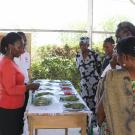Success story: Postharvest training in Tanzania
Supporting postharvest in Tanzania’s horticulture sector
In Tanzania horticulture is one of three value chains that Feed the Future activities focus on for greatest impact. Horticultural crops are particularly sensitive to poor postharvest practices, with estimates that half of fruits and vegetables grown in many sub-Saharan Africa countries are lost during postharvest phases.
To enable Feed the Future partners— including educators, industry professionals, and government employees—to better support horticultural development, the Horticulture Innovation Lab led a project to increase training infrastructure and provide training-of-trainers for improved postharvest practices of fruits and vegetables.
At the Horticultural Research and Training Institute in Tengeru (HORTI Tengeru), Horticulture Innovation Lab team members designed a field packing shed and charcoal cooler, which were later built and installed by partners at the World Vegetable Center. The site had an insulated room, which the Horticulture Innovation Lab converted into a working cold room, with the addition of a CoolBot and air conditioner. These postharvest facilities now allow for packing, cooling and storage of crops harvested from HORTI Tengeru’s acres of field trials, for improved sales at a market nearby.
In July, the Horticulture Innovation Lab provided a five-day course in postharvest handling of horticultural crops to more than 40 professionals from all over Tanzania, including university professors, technical trainers, industry leaders, and government representatives.
The course was led by Michael Reid and Angelos Deltsidis of the Horticulture Innovation Lab, with Marita Cantwell of the UC Davis Postharvest Technology Center, and Ngoni Nenguwo of the World Vegetable Center. The course was hosted at the Postharvest Training and Services Center on the World Vegetable Center campus in Arusha. Juma Shekidele of HORTI Tengeru also provided assistance in organizing the course.
Each day the course started with lectures covering postharvest principles and practices for crops with commercial potential in Tanzania, including eggplants, tomatoes, bananas, mango, papaya, citrus, avocado, leafy greens, green beans, cherimoya, onions, cut flowers, cucumber, potatoes and carrots.
Hands-on activities were also part of the course. Participants conducted exercises to examine maturity, produce quality, cooling, packaging, and water loss. Each participant also received a postharvest toolkit and learned how to use the tools with different fruits and vegetables through the exercises.
The course included a module on solar drying, in which attendees constructed and tested the UC Davis-designed chimney solar dryer. The dryer proved its effectiveness in demonstrations; despite heavily overcast conditions, products dried rapidly.
The class also took a couple of short field trips, visiting the local wholesale market, an export packing operation and HORTI Tengeru to see the postharvest facilities and horticultural field trials.
After the course’s conclusion, evaluations included many positive comments from participants. Weeks later participants also reported incorporating the chimney solar dryer and other demonstrations into farmer field days in other parts of Tanzania.
“I will use and teach this course to my farmers who produces tomatoes and onion,” reported one participant. Many commented that the course should be offered repeatedly in the future.

